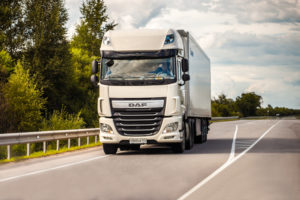The United States Federal Highway Administration (FHWA) is responsible for overseeing and promoting the general quality and integrity of freight management and operations throughout the country. As a division of the U.S. Department of Transportation, this body of government serves to provide information regarding freight trucks and general containerized trucking information. In the United States, citizens depend on containerized trucks to transport the goods and products that are used each and every day.
An intermodal container is the hub of containerized trucking, as these intermodal containers are the standard steel boxes used to safely and efficiently secure or store products and materials. The containerized trucking information regarding these reusable intermodal containers is a standardized system to promote consistency and safety throughout the nation’s trucking industry.
While the shipping container industry is highly regulated by the FHWA, freight trucks are continually involved in motor vehicle collisions each and every day. The intermodal containers are constructed in a manner to be stacked, loaded, unloaded, and transported as efficiently as possible. In fact, these containers are even constructed to be transferred between different modes of transportation (semi-trucks, rails, and container ships) with ease.
Sadly, even this highly regulated industry is subject to human error. When an error does cause injury to an innocent party, liability may fall on a wide range of different negligent parties. Being aware of the most important containerized trucking information will play a significant role in the litigation process in the event of an accident. If you or a loved one has suffered from an injury due to a containerized trucking crash, Jonathan Perkins Injury Lawyers are here to help.
To get started today, please complete a Free Case Evaluation form on this page.
Containerized Trucking Information To Know
The containerization trend began after World War II. In an effort to reduce transportation costs as well as increase the amount of international trade, container standards were outlined in order to boost efficiency and productivity. The reusable steel box referred to as an “intermodal container” can suit a wide range of materials and contents while being transported to a number of different modes of transportation.
The trucking industry uses quite a few different names to refer to these containers. The following are the most commonly used labels for intermodal containers:
- Shipping container
- Freight container
- ISO container
- Box
- Conex box
- Sea can
- Hi-Cube container
- Container
These terms are interchangeable and are often used in regard to the particular material being transported or the mode of transportation being utilized. The United States tends to use longer intermodal containers, usually at 48 ft. and/or 52 ft. The capacity of any container is generally expressed in terms of TEU (twenty-foot equivalent units). In the United States, the most common standard lengths of containers are as follows:
- 20-ft
- 40-ft
- 45-ft
- 48-ft
- 53-ft
The sizes of the containers vary dependent upon what types of materials are being shipped as well as the transportation methods used. In addition to specifying elements on the inside of these containers, freight truck operators must also focus on the contents of the containers. The type, weight, and potential hazards of the freight being carried are essential.
Some of the most damaging accidents occur due to the improper loading of cargo. When a container is full it is referred to as FCL, also known as a full container load. When the contents of the containers are not fully loaded, the cargo is said to be LCL, also known as less than container load. In addition to issues with the size and weight of the container loads, additional issues arise in regard to fuel costs, empty containers, and hazards within the loads.
Free Case Evaluations With Our Skilled Lawyers
Truck accident litigation is one of the most complex areas of law today. As such, when an accident occurs involving a large commercial vehicle, it is critical to seek the advice and guidance of a legal professional. Jonathan Perkins Injury Lawyers have studied the ins and outs of containerized trucking information. With this knowledge, we are able to craft a case for our clients that breed the maximum compensation possible.
We have offices in New Haven, Bridgeport, Hartford, Waterbury and New London, and serve clients throughout Connecticut. Our goal is simple, put our clients in a position to win maximum payments for the injuries that a negligent party caused. We work diligently to provide you with the comfort and care that you deserve during this difficult, stressful time. Our compassionate accident injury attorneys have dedicated over 25 years to serving the residents of Connecticut. Call us toll-free at 800-PERKINS or fill out a Free Case Evaluation form on this page to learn more about your legal options.

